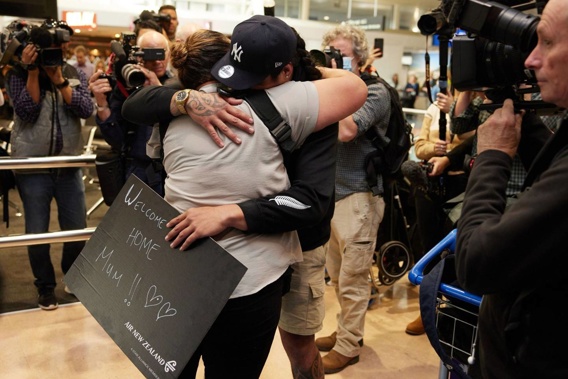
OMICRON LATEST:
* Chris Hipkins' regrets over accidental release of vaccine cost data
* Charlotte Bellis' lawyer disputes claim emergency MIQ path exists for pregnant Kiwis
* Not a 'cold hearted epidemiologist': How pandemic has affected Michael Baker
* Audrey Young: NZ's reputation takes a hammering
The Prime Minister is set to announce borders will open on February 27 to returning New Zealanders and critical workers from Australia, who will be able to bypass MIQ.
And Kiwis in the rest of the world should be able to return in mid-March.
Jacinda Ardern will reveal the final decisions on reopening the border at a speech in Auckland today.
The Herald understands the Government will let vaccinated New Zealanders coming from Australia return and self-isolate, rather than stay in MIQ, after Sunday February 27.
In mid-March, that will likely extend to vaccinated New Zealanders from other countries.
Special provisions will also be made for critical workers to try to address skills shortages.
It is likely the home isolation periods for those travellers will mirror those set for close contacts of Omicron cases domestically.
The isolation period is now 10 days but will change to one week when Omicron is more widespread in phase 2 of the pandemic response plan.
Last November's plan to reopen the borders in a staged approach from mid-January was put on hold shortly before Christmas, as Omicron proliferated overseas.
On December 21, the start date was pushed out to late February but that was under review, depending on Omicron.
The PM said yesterday that decisions on the border would soon relieve the bottleneck of managed isolation.
MIQ was activated almost two years ago and demand for it had skyrocketed.
The system caused increasing headaches for the Government, with pregnant TV journalist Charlotte Bellis the latest of a string of Kiwis in tricky situations struggling to get home.
Bellis has confirmed she will return to New Zealand in early March to give birth to her baby girl, after accepting an emergency spot in MIQ.
At a press conference yesterday, Ardern said there would be multiple people in distressing situations struggling with MIQ - but on the flip side, the system had saved lives.
She said a new system was in sight, which would help remove that bottleneck.
Asked about other pregnant women struggling to get home, Ardern said an emergency allocation system existed.
But she added: "What is going to make the biggest difference here is not having to rely on MIQ in the same way."
Public health expert Dr Matt Hobbs said the timing of any home isolation scheme was of more importance than details of the scheme's operation.
That was because New Zealand seemed to still be in the early stages of the Omicron outbreak.
"The Omicron outbreak is going to evolve and we haven't seen the rapid spike in cases yet," said Hobbs, from the University of Canterbury School of Health Sciences.
He said New Zealand was in the "stamp it out" first phase of the pandemic response, or asymptomatic transmission was happening but not being officially recorded.
Hobbs said despite criticism directed at MIQ, the hotel isolation network was preventing hundreds of cases entering the community every week.
"MIQ's actually still serving its purpose and obviously it's going to change at some point."
Hobbs said it was crucial to take a long view of the Covid-19 pandemic, even beyond Omicron.
"This won't be the last variant. There is no guarantee the next one is going to be less severe."
He said the Government had a tricky job.
"It's going to be quite a challenge to get the decision right."
Previously, the plan was for people from Australia to be allowed to isolate at home for seven days after January 16, and those from other countries from February 13.
All fully vaccinated foreign travellers would have been able to travel from April 30.
Today's border news will also follow a move to shorten the gap between second vaccine doses and boosters from four months to three.
Ardern made the booster announcement in Wellington yesterday.
Ministry of Health chief science adviser Professor Ian Town, Covid-19 Response Minister Chris Hipkins and director general of health Dr Ashley Bloomfield joined the PM.
Hipkins said the new three-month interval would apply from this Friday.
Town said a three-month gap should help ensure immunity greatly improved before widespread Omicron community transmission.
Bloomfield said some immunocompromised people who'd already had a third dose could get a fourth dose, which would qualify for them as a booster shot.
The new waiting time for boosters mirrors what some states in Australia have already implemented.
Take your Radio, Podcasts and Music with you









